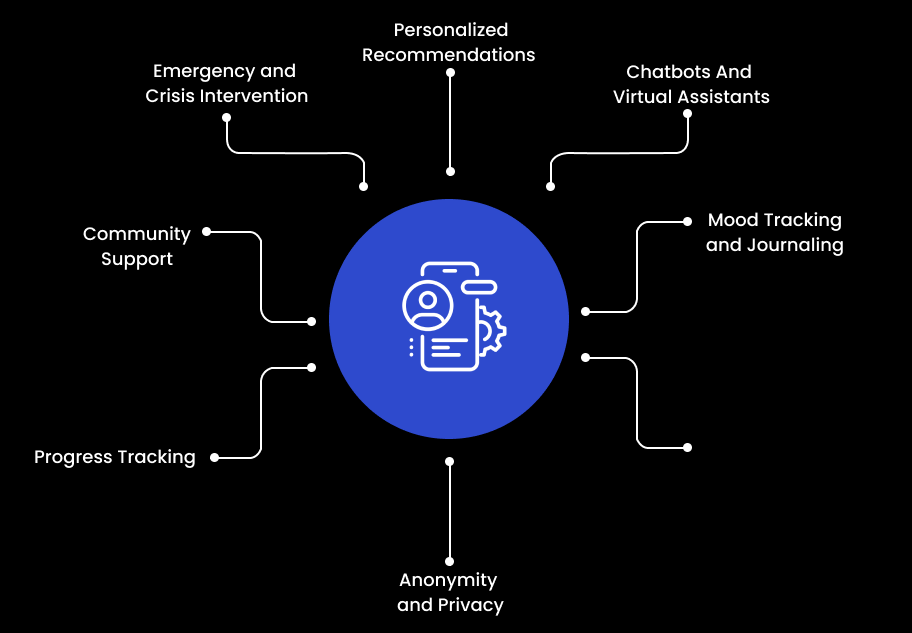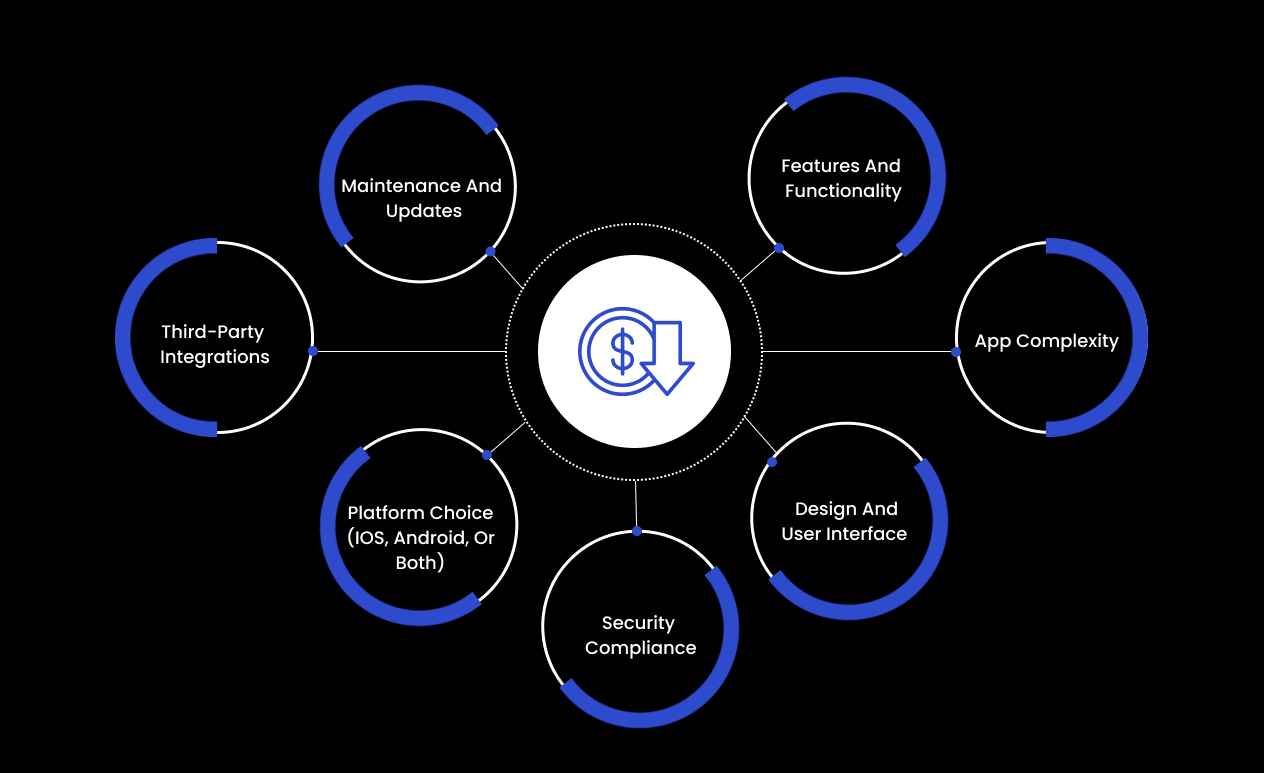Mobile App
Mental Health App Development: Types, Features, Benefits & Costs
 Updated 01 Oct 2024
Updated 01 Oct 2024

Mental health app development has become a critical concern in today’s fast-paced world. According to the WHO, at present, over a quarter of the global population, have experienced mental or neurological disorders at some point in their lives. This highlights the growing need for accessible, efficient, and functional solutions to support individuals facing these challenges.
Fortunately, advancements in mobile technology have paved the way for mental health apps offering effective support that is readily available, affordable and private. These apps provide a lifeline for those seeking help, breaking barriers to traditional mental health care and empowering users to manage their well-being anytime, anywhere.
In this blog, we will discuss the types of mental health apps, their important features, the advantages and disadvantages of mental health apps, and also, the cost required to create an efficient mental health app.
What is Mental Health App Development?
Mental health app development is a type of custom healthcare app development focused on creating solutions to address mental health issues. These apps range from guided meditations and mindfulness exercises to full-featured comprehensive therapy applications allowing individuals to reach out to licensed therapists. According to Fortune Business Insights, the mental health application market is projected to grow to 3.3 billion by 2027, highlighting the increasing reliance on digital tools for mental health support. As more people seek accessible and effective solutions, the demand for innovative mental health apps continues to rise.
Types of Mental Health Apps
Mental health Apps as such are different – each one catering to a particular need.
1. Mindfulness and Meditation Apps
Mindfulness and meditation apps offer features like guided meditation sessions, breathing exercises, mood tracking, and personalized programs to help users reduce stress, improve focus, and achieve emotional balance. Key features often include customizable meditation lengths, soothing soundscapes, and reminders for daily practice. The latest trends in mindfulness apps are increasingly incorporating AI-driven personalization, VR and AR experiences for immersive meditation, and gamification to boost user engagement. Additionally, many apps now offer features to track users’ mental progress over time, making them powerful tools for both mental health maintenance and personal growth.
2. Cognitive Behavioural Therapy (CBT) Mobile Applications
Cognitive Behavioral Therapy (CBT) apps are designed to help users manage and improve their mental health by applying principles of CBT, a widely used therapeutic approach that focuses on identifying and changing negative thought patterns. These apps typically offer self-guided exercises, thought diaries, mood tracking, and interactive tools to challenge unhelpful beliefs and behaviors. Users can explore techniques for managing anxiety, depression, and stress in a structured, step-by-step format. Recent trends in CBT apps include AI-driven chatbots, that provide real-time support, and progress tracking features that help users monitor their emotional growth over time, making mental health care more accessible and proactive.
3. Mood Tracking Apps
Mood tracking apps are designed to help users monitor their emotions and mental well-being over time. These apps allow individuals to log their daily moods, feelings, and experiences, often using simple interfaces like mood scales or emojis. By tracking patterns and triggers, users can gain insights into their emotional states and identify factors that affect their mental health. Key features often include mood journals, reminders for daily check-ins, and visual reports that show trends over days, weeks, or months. Some apps also integrate with other health tools, offering personalized suggestions or activities to improve mood. Recent trends include AI-driven mood analysis, mood forecasting, and integration with wearable devices, making these apps a powerful tool for self-awareness and emotional regulation.
4. Therapy and Counseling Apps
Therapy and counseling apps provide users with convenient, accessible mental health support by connecting them to licensed therapists and counselors through digital platforms. These apps typically offer services such as video sessions, live chat, and audio calls, allowing users to engage in real-time therapy from the comfort of their homes. Many also include self-help resources, mental health assessments, and therapy exercises to supplement professional guidance. Popular apps like Talkspace and BetterHelp offer flexible scheduling, anonymity, and lower costs compared to traditional therapy. Recent trends in therapy apps include AI-powered mental health assessments, 24/7 crisis support, and specialized therapy options for conditions like PTSD or relationship counseling, making mental health care more inclusive and accessible. The BetterHelp and Talkspace are good examples of Apps that fall under this category.
Key Features of Mental Health Apps

1. Personalized Recommendations
Personalized profiles powered by AI-driven suggestions allow the app to recommend exercises, coping strategies and content based on the user’s emotional state and health issues.
2. Chatbots and Virtual Assistants
They provide users with real-time, conversational support using AI-driven technology. These digital tools simulate human-like interactions to help users manage stress, anxiety, or negative thoughts, offering guidance and coping strategies based on Cognitive Behavioral Therapy (CBT) principles. Chatbots like Woebot and Wysa allow users to express their emotions, track their moods, and receive immediate, non-judgmental responses. Being able to speak with professionals in real-time is a bonus when one needs help immediately.
3. Mood Tracking and Journaling
Prove helpful to users as they can keep track of how their brain is functioning and the various emotions they feel over time, all of which is valuable when it comes to tracking their mental health.
4. Guided Therapy Sessions
Access to licensed therapists via video, chat, or audio for real-time therapy and counseling. Notifications and prompts for therapy sessions, or reminders help people stay on track with their recovery.
5. Anonymity and Privacy
Secure, encrypted communication and the option for users to remain anonymous for privacy protection.
6. Progress Tracking
Visual reports and summaries of emotional trends, therapy goals, and overall mental health progress over time.
7. Community Support
Peer support networks and forums where users can share experiences, offer advice, and receive encouragement from others.
8. Emergency and Crisis Intervention
Features such as hotlines, emergency contacts, and instant resources for users in urgent need of help.
Benefits of Mental Health Apps
Mental health apps offer several benefits for users and the healthcare industry, bridging the gap between individuals and mental health support. They provide 24/7 accessibility, making it easier for users to seek help without the constraints of time, location, or stigma associated with traditional therapy. For the healthcare industry, these apps serve as scalable tools to reach larger populations, reduce the burden on mental health professionals, and promote early intervention through self-help resources and data-driven insights. Some of the top mental health apps, like Calm, Headspace, BetterHelp, Talkspace, and Moodfit, empower users with personalized and evidence-based support to effectively manage stress, anxiety, and other challenges, contributing to improved overall well-being.
Accessibility
These applications help many people to get support, for example, people from the villages or those who cannot come to attend the sessions physically.
Affordability
Because mental health apps are generally less expensive than conventional counselling, they reach a broadera broader population.
Convenience
Customers can get assistance when and wherever they want — at any time of the day — from the comfort of their homes.
Engagement
Things like logging one’s moods and getting notifications for daily routines increase the chance of sustained change in behaviour.
Cost to Build a Mental Health App

1. Features and Functionality
Basic features like mood tracking, guided meditations, or journaling are less expensive to develop compared to advanced features like AI chatbots, live therapy sessions, or real-time data syncing.
- Basic apps: $20,000 to $50,000
- Medium complexity apps: $50,000 to $150,000
- Advanced apps (AI-driven, multi-platform): $150,000 to $300,000+
2. App Complexity
A stripped-down app with fewer functions will cost less than an app with functions such as video calling or image recognition.
3. Design and User Interface
App development costs can also go up due to the necessity of qualified designers and developers for the for the creation of a beautiful, yet simple interface.
4. Security Compliance
That helps the app meet legal requirements such as HIPAA, but HIPAA or GDPR compliance but can also increase the cost and time of application of application development.
5. Platform Choice (iOS, Android, or Both)
Creating the Developing a mental health app for both the Android and iOS device is actually more expensive than creating it for just for just one platform, even in cases where it is cheaper to write the code once and deploy to multiple platforms. Cross-platform development tools like React Native can help reduce costs.
6. Third-Party Integrations
Integration with third-party services like video calling APIs (e.g., Twilio for therapy sessions) or payment gateways can add to the cost.
7. Maintenance and Updates
Post-launch, regular updates, bug fixes, and app maintenance will add to the overall cost. Typically, companies allocate 20% of the initial development cost annually for maintenance.
Monetization Strategies for Mental Health Applications
Mental health apps can adopt various monetization strategies to ensure sustainability while providing valuable services. Subscription-based models are among the most popular, offering users access to premium content, guided sessions, or advanced features for a recurring fee. In-app purchases, such as additional therapy sessions, specialized courses, or personalized plans, can also generate revenue. Advertising, particularly for wellness-related products and services, is another viable strategy, provided it aligns with the app’s purpose and respects user privacy. Partnering with organizations like employers, schools, or healthcare providers to offer app services as part of wellness programs is an effective B2B approach. Additionally, offering freemium models, where basic features are free but advanced tools require payment, can attract a broad user base while driving revenue from engaged users.
Why Q3 Technologies for Mental Health App Development Services?
At Q3 Technologies, we bring extensive expertise in developing innovative mental health applications that cater to the diverse needs of users. Our team understands the complexities of mental health challenges and incorporates evidence-based practices into every aspect of app design.
We take a comprehensive development approach, offering end-to-end services that cover everything from initial concept and design to deployment and ongoing maintenance. Our agile methodology allows us to adapt quickly to changes, ensuring that the final product not only meets user expectations but also aligns with market demands.
User experience is at the forefront of our development process. We prioritize intuitive UI/UX design, ensuring users can navigate the app effortlessly, which enhances engagement and encourages regular use. Additionally, we place a strong emphasis on data security and compliance with regulations such as HIPAA and GDPR, protecting sensitive user information and fostering trust.
By integrating advanced technologies like AI-driven chatbots and data analytics, we create innovative features that provide personalized experiences. With our ongoing support and commitment to scalability, Q3 Technologies is dedicated to delivering impactful mental health solutions that promote well-being and accessibility. Our seasoned healthcare app developers guarantee that your mental health application is both secure and accessible while being life altering.


